There’s nothing like slipping on a fresh pair of sunglasses at the start of the summer. While a good pair of shades is fine for the pool, they’re crucial for trail rides where we need to protect our eyes not just the sun but also dust, wind, and tree branches. Oh, and being able to see trail obstacles clearly is nice too.
What makes a great pair of mountain bike sunglasses? Fit is one of the first features people look for when selecting sunglasses. A fit that matches your face shape and more importantly, is compatible with your helmet, is key when considering the perfect pair of glasses. Optical clarity is another important feature. Can you actually see the trail and changes in terrain when you ride as sweat builds up and light conditions change? Hopefully, otherwise there’s no point in wearing sunglasses. One feature that may go overlooked is style. Let’s be honest, there’s a certain amount of vanity involved in sunglasses selection. You need a style that is compatible with your heart; something that makes you excited to wear sunglasses and something that gives off the correct “vibe” for your adventures. Vibe check!
All of the eyewear we tested is designed with active performance in mind, though some look more performance-oriented than others. We tested shield-style performance cycling glasses as well as a handful of lifestyle mountain bike sunglasses to see which ones fit our faces and riding styles the best. In the style column below, the lifestyle label denotes sunglasses with a more casual look. Let’s begin with the sportier performance sunglasses that we like for mountain biking.
| MTB Sunglasses | Style | Lens | Price |
|---|---|---|---|
| 100% Eastcraft | Performance | Both one-piece shield and dual lens, bonus clear lens | $195+ |
| 100% Hypercraft | Performance | One-piece shield, bonus clear lens | $155 |
| Bollé Brecken | Lifestyle | Dual lens | $90+ |
| Bollé Chronoshield Volt+ | Performance | One-piece lens, polarized or photochromic lens | $170+ |
| Dragon Ridge X LL | Performance | Dual lens, interchangeable | $245 |
| Glade Roost | Performance | One-piece lens, polarized or photochromic lens | $109 |
| Glade Townie | Lifestyle | Dual lens, polarized | $69 |
| Julbo Edge | Performance | REACTIV photochromatic lens | $260 |
| KOO California | Lifestyle | Dual lens, polarized and non-polarized | $150 |
| Nathan Sunrise | Lifestyle | Dual lens, polarized | $60 |
| Ombraz Teton | Lifestyle | Dual lens, polarized and non-polarized | $145+ |
| POC Crave | Performance | One-piece lens | $265 |
| POC Devour | Performance | One-piece lens, bonus clear lens | $250 |
| Roka Halsey | Lifestyle | Dual lens, polarized, customizable | $180 |
| Roka Lola 2.0 | Lifestyle | Colorful frames and good fit for smaller faces | $220 |
| Rudy Project Spinshield | Performance | One-piece lens, photochromic available | $164.99+ |
| Scott Pro Shield | Performance | One-piece lens | $109.99 |
| Smith Bobcat | Performance | One-piece lens, bonus clear lens | $209+ |
| Smith Momentum | Performance | Lightweight, quasi-goggle | $230 |
| Smith Shift Split Mag | Performance | Easy lens swaps, ChromaPop lenses | $289 |
| Sunski Topeka | Lifestyle | Dual lens, polarized | $68 |
| Sweet Protection Ronin | Performance | One-piece, polarized | $200 |
| Tifosi Rail XC | Performance | Lightweight and affordable | $80 |
| Tifosi Sledge | Performance | One-piece lens, three interchangeable lenses or photochromic | $79.95 |
| Tifosi Swank | Lifestyle | Dual lens, polarized and non-polarized, customizable | $25+ |
| Tifosi Swick | Lifestyle | Prescription option available | $100 |
Mountain Bike Performance Sunglasses

100% Eastcraft
- Price: $195 – $225
- Available at Amazon
- Tester: Matt Miller
The 100% Eastcraft’s shaded lens is a single piece, cyclops-style shield that stretches across the face, but the glasses also include two clear lenses. These replace the single-piece lens and leave an open channel of wind above the nose bridge.


“If sunglasses need an instruction manual, they’re too complicated,” I grumbled when I first examined the Eastcrafts and the accompanying pamphlet. The glasses come with a tool shaped specially for a clamp that swings from above the nose bridge and secures the lens into place. In typical 100% fashion, the packaging around the glasses is obnoxiously big, similar to Beats headphones or a new Apple product, though even Apple has slimmed down the amount of crap that comes with a new iPhone.
With the box in the recycling bin and the foam filler in the waste bin (grr) the Eastcrafts have become my new favorite pair of mountain bike sunglasses. They are light, comfortable, and like any good pair of glasses, they feel like they’re barely there. The lens swap can be done with a fingernail, sans tool and pamphlet, in just a minute or so. It does seem a little odd that the included clear lenses aren’t a single piece too, but not a big deal.
The Eastcrafts sit on the aggressive end of eyewear, like most of the brand’s glasses and they are also pretty pricey, but fit and feel great.


100% Hypercraft
- MSRP $155
- Available at Amazon and other retailers
Personally, after riding single-piece lenses over the past couple of years, I like them more than two separate lenses. Usually, there is a larger field of vision, they cover more of your peripheral, and still allow the rider to have a decent peripheral vision without obstruction.
The 100% Hypercraft sunglasses fit this description to a tee. They have a wide, unobstructed and well covered field of view. They are also exceptionally light, comfortable, and vented. The looks however, will be divisive for some. I didn’t mind the appearance, especially given their performance, but they’re on the racy end of mtb sunglasses.
The Hypercrafts come with an extra set of clear lenses, and they are very simple to change. Just pop the temple off the corner of the lens, and snap it into place on the other lens. Although $155 isn’t cheap, it feels like a solid value for the Hypercraft. They are a killer pair of glasses for riding in any conditions. The darker lenses aren’t too dark for deep in the woods, and they are easy to convert on the trail to the clear lenses.
Bollé Chronoshield Volt+ Polarized Sunglasses
- Price: $170 – $260
- Available at Bolle
- Tester: Chris Scheiffer
Bollé recently resurrected one of its most iconic eyewear shapes of the past; the Chronoshield. The original Chronoshield sunglasses were created in 1986, capturing the hearts of neon lovers everywhere, with bright colors and an oversized lens inspired by Bollé’s Chrono ski goggles.
My first thought upon handling the Chronoshields extra large protective case was “holy hell, exactly how big are these”? Upon opening the case, I actually laughed out loud at the size. Truly, they look like ski goggles without a strap. It’s not a bad look per se, in fact it’s rather unique among the large glasses of today. However, enormous goggle-glasses aren’t the sort of thing that tend to fit petite faces like mine in a flattering way. After a few moments of contemplation, I slipped the glasses on; “confirmed, these are rather huge.”
You may have noticed the trend toward larger eyewear over the last few years. Countless brands are cranking out windshield-sized face protection and Bollé is no exception. This particular pair came with the top-of-the-line Volt+ Polarized Lens.
The Volt+ lenses are claimed to enable the wearer to see colors never perceived before while maintaining a natural white point. Bollé also says the lens offers increased depth perception, high-performance polarization, and 16% light transmission. As a bonus, the lens is coated with a proprietary anti-fog layer and lens vents, that quickly clear moisture. Frankly speaking, the lens is the star of the show; allowing you to see things in ways you’ve never seen before.
The Chronoshield frame is constructed using lightweight durable nylon, measuring 147mm across and 65mm vertically. The temples measure 118mm, the ends of which are finished with malleable Thermogrip rubber that can be bent to any head shape, keeping the glasses locked into position. Warning: not slippery when wet. In fact quite the opposite they stick better when wet. The self-adjusting nose piece features the same grippy rubber, and despite my best efforts, I could not sweat these off my nose.


The Chronoshield has the widest and deepest field of vision I have experienced outside a snow goggle, offering complete eye protection from wind, dust, rain, and rogue pebbles. As an homage to the original, a removable foam padded brow bar sits atop the frame amplifying the goggle feel. This feature is useful for sweat absorption and for shielding overhead sunlight when the helmet is removed. One downside is that it increases the height of the frame, interfering with some low-set helmets.
I can’t claim that you won’t look “extra” in these oversized, google-esque glasses, but I can say your face will be shielded and you won’t be disappointed with the lens quality. Yes, the size of the Chronoshield will prove to be overwhelming for some faces, however, the styling and features of these behemoths really up the ante in modern eyewear.

Dragon Ridge X LL sunglasses
- Price: $245. Lumalens Orange Ion lens pictured.
- Available from Dragon Alliance and REI.
- Tester: Jeff Barber
The Dragon Ridge X LL sunglasses offer extra coverage for a wide-angle view of the trail and the interchangeable, dual-lens system means we’re prepared for pretty much any trail in any conditions. The frames are made from castor bean oil which means they’re plant-based and petroleum-free which is said to be environmentally friendly. With the extra lens real estate, my test pair weighs 37g. Adjustable temples, along with a rubber-like coating on the ends of the arms, make for a slip-free fit.

Glade Roost Sunglasses
- Price: $89 (polarized lens) – $109 (photochromic lens)
- Available from Glade.
- Tester: Matt Miller
The Glade Roost are a light and simple uni-lens pair of sunglasses with a wide field of vision that works great for mountain biking. Glade is based out of Breckenridge, Colorado. The Roosts have a polarized, scratch resistant lens, a rubberized nose, and are made from a lightweight Grilamid material. These don’t have quite the premium feel as the 100% Norviks or some other glasses, but they do feel light and comfortable.
The pair I received has a photochromic lens that adjusts from light to dark or vice versa based on the amount of sun in the sky. They’re a good pair of shades for those who want a single lens with good visibility for all styles of riding.


Julbo Edge sunglasses
- Price: $260
- Buy from Backcountry and evo.
- Tester: Matt Miller
Initially, I thought these were clear riding glasses. That is, until I got into the sun. Almost perfectly clear in low light, the Julbo Edge sunglasses offer good coverage without any blind spots thanks to a mostly wraparound design. Julbo says their REACTIV lens tech offers “the widest photochromic range and fastest reaction time on the market,” and in full sun the Edge sunglasses take on a surprisingly dark amber tint that almost appears reflective on the outside.
The single-piece lens snaps into place using strong magnets at the bridge. It’s one of the easiest systems I’ve tried, and ensures you don’t get greasy fingerprints on the lens. Since the lens is only attached at the center, it floats outside the frame and can get a little clacky on the roughest trails. The nose pads are adjustable for a secure fit to most faces.
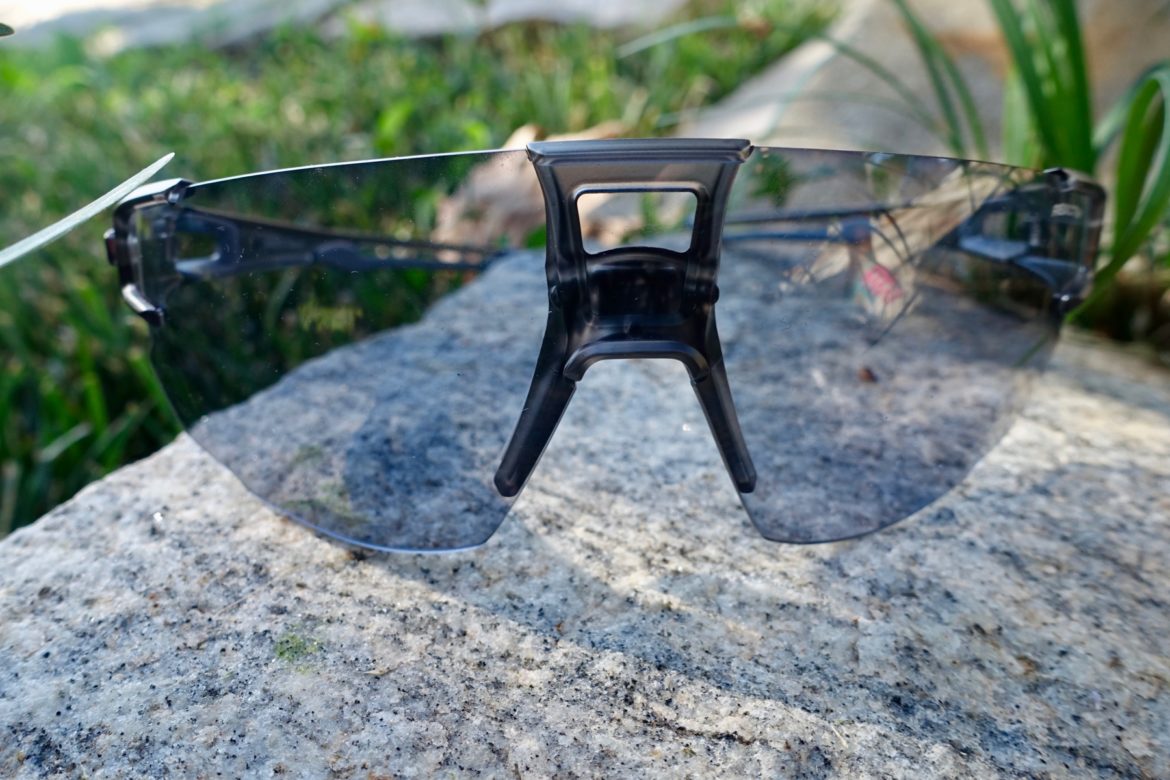

The Julbo Aerospeed sunglasses are comfortable thanks to the flexible nose pads and rubber-like temple tips. The tips allow the temples to sorta float above the ear and the material does a good job holding the glasses in place. At just 27g (actual), the Aerospeeds almost feel weightless.


POC Crave
- Price: $265
- Available at POC Sports
- Tester: Gerow
In keeping with the other shades we tested, the POC Crave MTB sunglasses tip the balance at a meager 29 grams. The ample frames hug the sides of the head well, and POC’s hydrophilic rubber nose gripper keeps them in place even when sweat is working to slide them free. The interchangeable lenses work well in bright sunlight and are a bit darker than I would like for forested riding.
The large lenses of the POC Craves provide impressive coverage to keep your eyes clear and clean. The frames are designed with “snap-in hinges” to allow them to come apart on impact rather than breaking. I find this feature frustrating, as the frames come apart if I simply take the glasses off too quickly. For less ham-fisted riders this shouldn’t be an issue.


POC Devour
- Price: $250
- Available from POC Sports and other retailers
- Tester: Gerow
The POC Devour mountain bike sunglasses offer the broadest eyeball protection of any non-goggles I’ve seen, and they integrate nicely with the larger helmet shell for a clean look. They are essentially a goggle-lens clamped to a frame, and apart from the dust that blows in the side door, they will protect your eyes just as well as a strapped-on shield.
The temples are fully adjustable, and while the lens will look huge on people with smaller faces, they will fit a wide variety of head shapes and sizes.


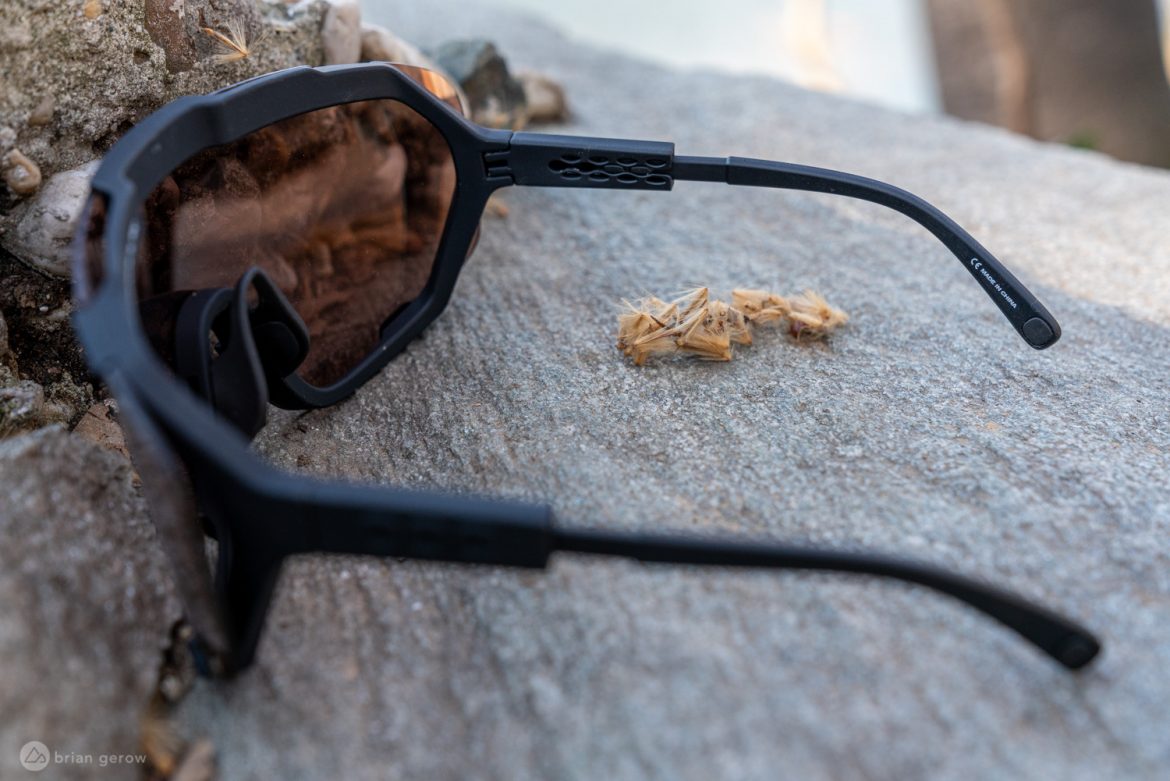
The lenses appear super dark from the front, since the mirrored face makes it difficult to see your eyes, but from the wearer’s side the tint is light enough to wear on the trail on a bright day. In overcast conditions I have found them too dark in the shade, but there are interchangeable lenses with less tint available.
The lens gets loads of fancy treatments, including what POC calls “Ri-Pel hydrophobic and oleophobic treatment to protect from dirt, water, sweat, salt, oil, and dust,” as well as an anti-scratch treatment and protection from both UVA and UVB rays.
When I first saw the Devour sunglasses I assumed they would be far too heavy, sliding all over the place on rough descents. Instead, they fit well on my 61cm melon, and the soft rubber at the nose and ears can be bent to cinch them in place.
Rudy Project Spinshield
- Price: $164.99 – $219.99.
- Available from Rudy Project.
- Tester: Chris Scheiffer
I took the Rudy Project Spinshield out for a few rides myself and decided they’re just a tad too big for my noggin. To aid in “my” review of these sunglasses, I had my 10-year-old son, who has a much larger head/face, wear them and report back. Here are his thoughts (slightly edited) on the style, fit, and performance of the Rudy Project Spinshield Sunglasses.
“The style seems pretty modern (clearly he was born in 2011). I love the larger size and hot pink color. The Spinshield provides a lot of face coverage and the lens delivers unobstructed, crystal clear vision while keeping dust and debris out of my eyeballs. They’re easy to clean and look cool, which makes people compliment me on the trails. The nose bridge is big enough to fit wide(r) noses and the rubber bridge material seems to get stickier when wet, so the glasses to stay put even on the bumpiest of rides. The arms are thin, lightweight, and fit under all helmets comfortably. It would be nice if the arms had the ability to bend a bit and mold more precisely around a particular head shape, but that’s not the end of the world. Overall, I really like the Spinshield sunglasses, my friends are jealous because I look so good on the trails.”
Pink FLUO with multilaser orange lenses, pictured right. Black Matte with Impactx Photochromatic 2 black lenses, pictured left.
Scott Pro Shield Sunglasses
- Price: $109.99. Pictured: mineral blue / green chrome.
- Available from Scott Sports
- Tester: Chris Scheiffer
The Scott Pro Shield sunglasses are geared toward medium/large faces and are meant to provide maximal field of vision through extra large lenses. The Pro Shield is lightweight (36g) and the frame is made from 45% bio-based polymers sourced from castor beans. You read that right; beans. On top of attempting to minimize their carbon footprint, Scott has also applied a fair amount of technology including: interchangeable lenses, no-slip nose and temple pieces, impact protection, optimized helmet integration, 100% UVA/UVB protection, and ACS (Air Control System) ventilation.
The silicon nose piece is said to be no-slip, but I found it did slip down my nose when bombing down chatter and when sweating heavily. Fortunately, the rubberized temple pieces hold nicely in place underneath my helmet adjusters. One feature I really like is the ACS (Air Control System) which refers to the almost unnoticeable cutaway vents on the top left and right of the brow.
Overall the Scott Pro Shield sunglasses are comfortable on their own, and with most helmets. I tried these on with all of my helmets (six to be exact) and I can confidently say they fit nicely with most of them. Though the rubber nose piece isn’t as grippy as I’d prefer; the style, weight, and lens quality is top notch.

Smith Bobcat Sunglasses
- Price: $209 – $229
- Available: Smith Optics.
- Tester: Leah Barber
That “so enduro” look doesn’t always work for smaller faces, and the Smith Bobcat is the smaller fun-duro version of the popular, goggle-like, enduro-sized Wildcat glasses. Now we can be in the cool kids club without glasses slipping off the ends of our noses! Seriously though, the Chromapop optics make everything clear and vibrant. There are also some new classy colors (navy, merlot, gold) to coordinate with their helmets.

Smith Momentum Sunglasses
- Price: $230
- Buy from Smith Optics.
- Tester: Matt Miller
The Smith Momentum is another great quasi-goggle for those with smaller faces and don’t want to be engulfed with their shades. The Momentums feel stable and secure under any movement or shaking. The two-position nose piece is easy to adjust although changing lenses is more involved.
Fortunately, you don’t have to do that often with the photochromic lenses. They transition surprisingly quickly from tinted to clear and vice versa. The photochromic lens isn’t as dark as other dedicated dark lenses but they still have good protection and keep a natural color to them when peering out.


Smith Shift Split Mag
- Price: $289
- Buy from Smith Optics.
- Tester: Matt Miller
The Smith Shift Split Mags are another favorite in the roundup. They come in about two handfuls of different color options, have Smith’s ChromaPop contrast/color-enhancing technology, photochromic lenses, smudge and moisture-resistant coatings, and grippy nose pads and temples.
These have a flatter fit than the Momentums and fit very lightly on the face, but have been stable. The ChromaPop might sound like snake oil, but it produces a distinct difference in color and contrast, and makes for some very vibrant greens. One of the nicest features on the Shift Split Mags is how easily and quickly you can swap the lenses. The temples essentially pinch off and so does the nose piece, before mounting to the other lens.


Sweet Protection Ronin Polarized
- MSRP: $200
- Available at Moosejaw
Sweet Protection continues to drop quality mountain bike apparel and protection. The Ronins compliment their line well, and have become a favorite. They have a technical look, but easily fit in on casual rides.
They have an anti-fog inner lense and a Super Oleophobic and hydrophobic coating which helps water roll off the lens, as to not become problematic for vision.
This technology seems to work pretty well, although it doesn’t stop sweat from gunking up the inside of the lens. If you’re OK with wiping the inside down occasionally, since the lens sits very close to the forehead, they’re a great option. I didn’t have any issues with the glasses sliding down. They vent well, although not the best out of the entire group.

Tifosi Rail XC
- Price: $80
- Buy from Jenson USA
- Tester: Matt Miller
The Tifosi Rail XCs are one of the more affordable glasses in the group. They are made with a smaller and lighter design than the Rails and do away with a frame to maximize the field of vision and are marketed for either cycling or baseball. Tifosi says the lenses have 100% UVA/UA protection, a light and durable Grilamid frame, adjustable nose and temples, and a small to medium fit. The glasses include three lenses in total.
The Rail XCs have a light fit. Though Tifosi says the Rail XCs are on the smaller side of fit, the temples spread open quite a bit. They fit well and have good coverage, and swapping lenses is simple and quick enough. My only complaint with the Rail XCs is that they have fogged up on me pretty quickly after coming to a stop on cooler, more humid days.


Tifosi Sledge
- MSRP: $79.95
- Available from REI
- Tester: Gerow
Tifosi is an Italian word that translates to “supporters.” It’s what Italian’s call sports fans, for example. The Sledge glasses appropriately fit the “supporter” moniker, with their massive windshield coverage and forgettably comfortable fit. The lens is vented across the top, and the frame rests far enough from your skin that they don’t fog up quickly.
All three of the included lenses offer different tints, and two of them are great for riding darker trails in thicker forests. The frame is one flexible piece, so there are no small bits to drop and lose while changing lenses. Considering their price, comfort, features, and overall protection, these are some of the best riding glasses I have tested to date.
Sledge frames come with three different vented lenses, a microfiber cleaning cloth, and a clamshell case. If you ride trail networks with varying degrees of tree canopy, these are definitely worth a look.
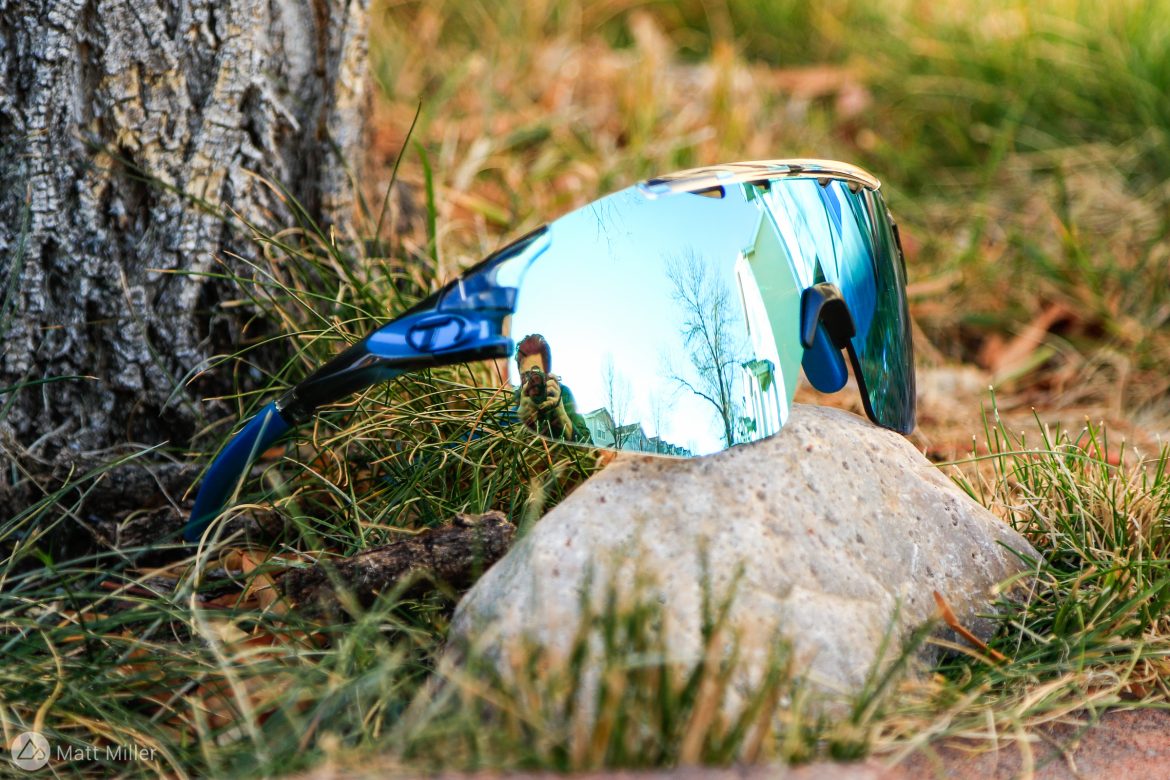
We also tested the Tifosi Sledge Lite. Despite the model name and implied “Lite” adjective, the Sledge Lites have a presence about them. Compared to the full Sledges, the Lites subtract the bottom portion of the frame for a lighter look and Tifosi says that the Lites “take all the performance of Sledge and packs it into a streamlined, lighter design.” The Sledge Lite is still an athletic, goggle-like pair of shades.
The Sledge Lites have adjustable temples and nose piece, a Grilamid frame, keeping it light and durable, and swappable lenses. We’ve put a season of use on the glasses and they are still in great shape and remained scratch-free. The blue lenses seem to add a reddish tint when looking through them and reduce highlights on well-lit objects.
The Tifosi Sledge Lite glasses are recommended for medium to extra large faces. On the top of the lens are four vents, and there is a vent on both sides of the glasses where the temples meet the lens and they bring in enough airflow to mitigate sweat build up around the eyes.
Mountain Bike Lifestyle Sunglasses
Having some eye protection while mountain biking is arguably essential, though you don’t always need a separate pair of sunglasses for on and off the bike. Most of these lifestyle mountain bike sunglasses are designed for everyday use by active individuals, making them great for multiple sports and life in general.


Blenders Eyewear
- Price: $49.
- Available from Blenders.
The Natty Ice Lime (right) and Royal Blitz (left) sunglasses from Blenders Eyewear both utilize the same “M Class X2” design but clearly offer different personalities. These aren’t bike-specific or performance-oriented glasses, weighing 30g and offering little-to-no wraparound. The temples and arms aren’t adjustable, and there’s no rubberized anything anywhere. Still, I’ve found they do just fine protecting from rays and slappy branches on the trail, and fit in just fine with my bike helmet.
I had a hard time choosing between the Natty Ice Lime and Royal Blitz glasses, so I ordered both. Each is available with polarized lenses for maximum ray blocking abilities, while the Royal Blitz adds a unique twist by fading from purple to yellow top to bottom. The effect is noticeable inside the glasses as well with the purple working to enhance contrast and the yellow to diffuse blue light on hazy morning starts. If I had to choose a personal favorite between the two styles, I would go with the Natty Ice Limes.


Bollé Brecken
- Price: $90 – $110
- Available at Bollé
The stylish Brecken frames from Bollé weigh in at a cool 29 grams, and that light weight helps to keep them from slipping off your face. The Brecken frames include a standard or polarized set of lenses (shown), and can be ordered with prescription lenses upon request. Bollé says they gave the lenses an anti-reflective treatment, hydrophobic treatment, and oleophobic treatment. That’s a lot of tech for one pair of shades.
I have a large head, and wide face and the Brecken frames fit quite well. Their temples squeeze my head just enough to keep the glasses from rattling around on my nose. The shape does allow more air, and possibly dust, in from the sides, but this might be a sacrifice some folks are willing to make to have a less performance-oriented aesthetic. The polarized lenses are a bit too dark for some sections of trail, limiting vision when the sun’s rays are blocked. For rides in moderate to direct sunlight, the Brecken shades are a good looking option.

Glade Townie Sunglasses
- Price: $99
- Available from Glade.
The Glade Townies are glasses for people who don’t like mountain bike glasses. They have a classic square wayfarer shape with rubber under the nose and at the end of the temples. The Townies come in five different colors, have polarized lenses, a partially bio-based Grilamid frame, and they do a great job at reducing bright glare.


KOO California Sunglasses
- MSRP: $150
- Available at Amazon and other online retailers.
On the chillin’ side of eye protection, the KOO California sunglasses have what I think of as a classic jazz saxophonist look. The lenses are broad, covering a large portion of my wider-set eye sockets. While the après-ski shape doesn’t lend a great deal of airflow, they are good for faster rides on flowy singletrack or dirt roads.
This pair has a polarized Zeiss lens, which I don’t find ideal for mountain biking as it seems to diminish shiny reflections on wet rocks and roots. Fortunately, the California shades are also available with two different non-polarized lens options, with seventeen different frame colors to choose from.
The California sunglasses include a carrying case to keep them in good shape before or after rides.
Nathan Sunrise polarized glasses
- Price: $60
- Available from Nathan Sports
These glasses from Nathan are straight to the point with the model name Sunrise Polarized Running Glasses, though they can obviously be worn for anything. Many riders I know, especially greener riders, aren’t into the racey, cyborg look and gravitate toward something more casual like these Nathans.
These polarized glasses are made from polycarbonate and offer 100% UV protection and are said to reduce glare. The inside of the temple’s ends are rubberized and the frame has a “soft feel.” The frame is also prescription lens compatible.
The Nathan glasses seem wide but fit my narrow face rather well. They are light and feel every bit as durable as some of the more expensive glasses in this review. The rubberized temples keep them where they are supposed to stay, but I wouldn’t mind a bit of rubber on the nose piece. An area where wider, single-piece lenses have an advantage sometimes over these types of casual glasses is on their peripherals, where the frame might intersect with a rider’s field of vision. The Nathans have a bit of that, but they don’t create a major blind spot or anything.
Perhaps the best thing about these easy-going athletic glasses is the price tag.


Ombraz Teton Armless Sunglasses
- Price: $145 (non-polarized) – $160 (polarized)
- Available from Ombraz.
Like the OG Ombraz, the new Ombraz Teton sunglasses are armless. Instead of arms, the wraparound nylon cord is adjustable to fit (and stay on!) more heads – yes, even small ones. The squarish lenses on the Tetons are scratch-resistant and available in grey, brown, and yellow. The grey lenses tested provide a good amount of shade, and with the armless design, these darker lenses are better suited for being out on a sunny day when you want to keep your glasses on for long periods of time. The incredibly light aerospace-grade nylon frames (23.9g in total) come in classy tortoise and charcoal styles.
The armless Ombraz Tetons and the more circular Viales aren’t your average sports sunglasses, and they do have a very chic, Euro vibe that’s perfect for all kinds of summer adventures. And with any pair of Ombraz sunglasses purchased, the company plants 20 mangrove trees.

Roka Halsey
- Price: $180 – $205
- Available from Roka
Wouldn’t you know it: the best “looking” glasses on this list are also among the most expensive. No shortcuts here, I found the Roka Halseys offer the clearest, most neutral view while blocking squint-inducing rays. The Halsey sunglasses seem to offer the least amount of darkening, which is great for riding trails that throw up a mix of full sun and full shade.
Roka says the “glacier mirror” lens in the Halseys I tested is a “moderate contrast, neutral-color lens that provides comfort during everyday use in very bright and sunny conditions.” All the lenses and coatings Roka uses are by Carl Zeiss vision, and they’re coated and cut specifically to fit Roka frames.



The clear frames I tried feel solid and substantial, and this is backed up by the fact that these weigh 25.7g, among the heavier sunglasses in this test. The hinges offer a good bit of resistance with virtually zero squeak. Black, rubberized temple tips keep the straight temples in place, though the downside is the temple ends tend to interfere with my helmet retention system a bit more than the others. The rubberized nose pads are not adjustable, but they utilize a clear white material so they blend into the white frame.

Sunski Topeka
- Price: $68
- Available at evo
Sunski believes sunglasses should look good, fit good, be affordable, sustainable, and work well for athletic endeavors. Sunski uses scrap plastic to make the frames. They also don’t use any plastic packaging and the glasses come in a recyclable (and recycled) cardboard packaging.
The Topeka are a Wayfarer-style of sunglasses and keep the sportiness dialed down to a minimum. They’ve turned out to be a great set of glasses on the trails, and work well for smaller faces. The Topeka have a sturdy hinge, and rubberized temples and a rubberized nose. They weigh 21.6g. The lenses are polarized and Sunski can replace lenses if they become too scratched. The only downfall I noticed testing, is that they can be a little dark in dark woods, otherwise they’re a great, affordable pair, and it’s great to see them put sustainability in the forefront of their company.
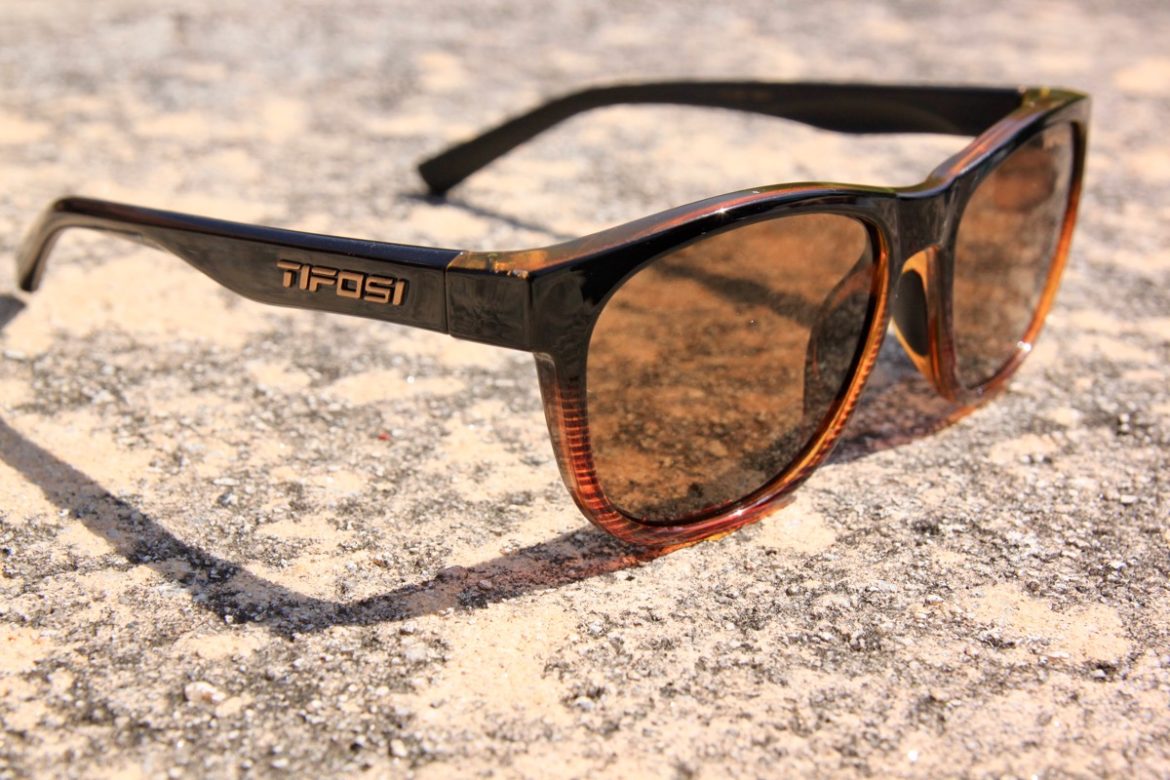
Tifosi Swank
- Price: $25 – $59.95
- Available from Amazon
- Tester: Jeff Barber
The Tifosi Swank sunglasses collection features a classic style at an affordable price: starting at $25 for non-polarized lenses, and $54.95 for polarized. Tifosi blows the others away in terms of color combos, giving buyers the ability to choose from 24 styles plus custom options.
The sunglasses provide adequate sun protection, though obviously not as well as the polarized or reflective lenses on this list.
While the Tifosi Swank sunglasses I tested do not feature rubberized temple tips, they do have padded (though not adjustable) rubberized nose pads. Unfortunately I found the Swanks to feel a bit crooked on my face compared to others in this test. They are also on the tight side, so perhaps better suited to riders with more narrow noggins than mine.

Roka Lola 2.0 Sunglasses
- Price: $220
- Buy from Roka
- Tester: Leah Barber
Many of the Roka sunglasses fit smaller faces well and the Lola 2.0 sunglasses in the new crystal frame collection have just enough color and flair for a fresh and fun look. The frames are incredibly lightweight and like all Roka sunglasses, have the no-slip grippers at the nose and temple tips to help keep the cat-eye frames on your face. The polarized lenses are crystal clear, giving leaves and rocks nice definition. Custom combos are also available with a half dozen lens types.

Tifosi Swick prescription sunglasses
- MSRP: Starts at $100 for prescription glasses; non-prescription starts at $25
- Buy from Amazon.
- Tester: Matt Miller
While it’s natural for many of us to wear prescription glasses at work, reading books, or watching TV, getting a set of prescription specs for riding, also known as our favorite pastime, can often take a backseat to other gear. Prescription sunglasses are expensive and sometimes hard to find.
We’ve reviewed a lot of Tifosi glasses in the past and we’re usually excited by the value in the brand. Tifosi makes a lot of good cycling glasses that cost half as much as other premium brands. When they offered to send some prescription riding glasses, I was excited to try them out.
Choosing the right prescription glasses is the hardest part: Most of the prescription glasses they offer fit in a more casual/active category and they offer few pairs of glasses that cyclists might look at as having potential for riding. Surely, this is part of the trick in having prescription lenses for two eyes and not just a singular shield across the face—most brands have the same challenge with prescription glasses.
I wanted to try the Rivets, but was told my pupil distance was too narrow for these, so I opted for the Swicks. They have a classic square framed look which isn’t out of place for everyday trail riding.
The glasses took a few minutes to adjust to on my first ride with them, but then I awoke to the vividness of prescription cycling eyewear and being able to see everything on the trail In high resolution.
The Swicks stuck to my face just fine and I haven’t felt like they would fall off, but they do get a little warm and sweaty since there is no venting. I ordered these with Fototec light-adjusting lenses, and they worked well in darker forests and exposed hills. Overall, I’ve been happy with the Swicks.












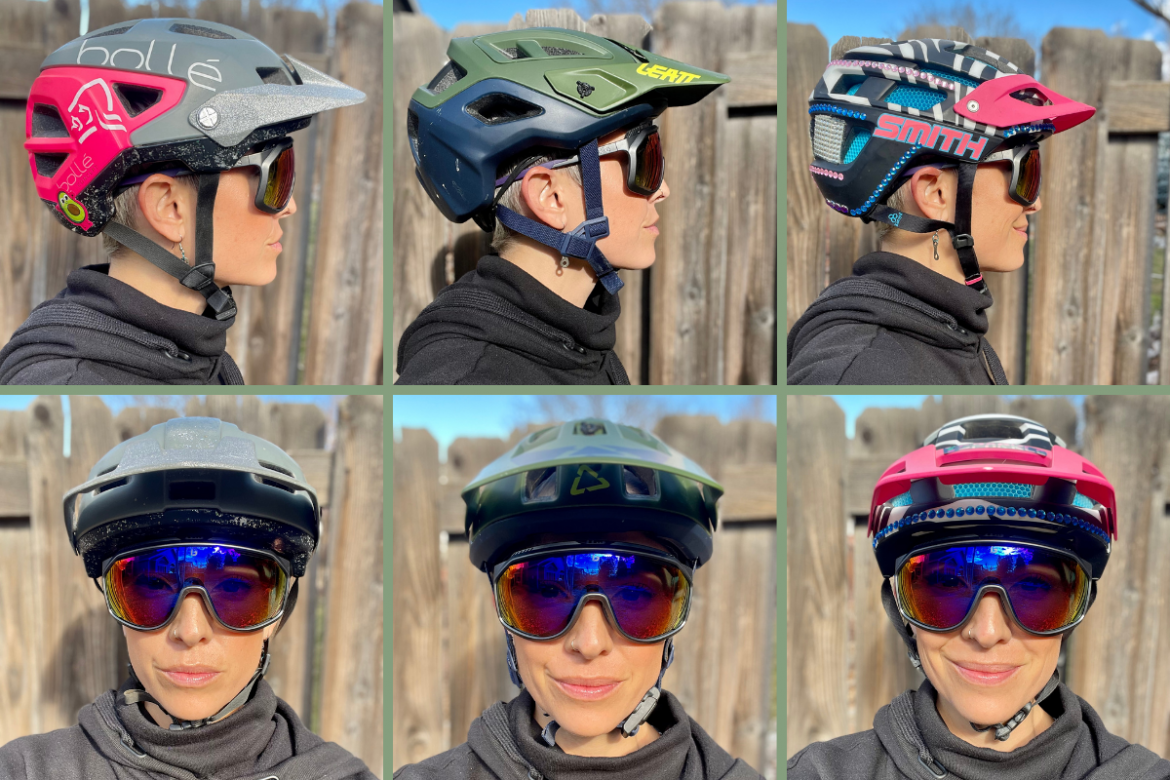

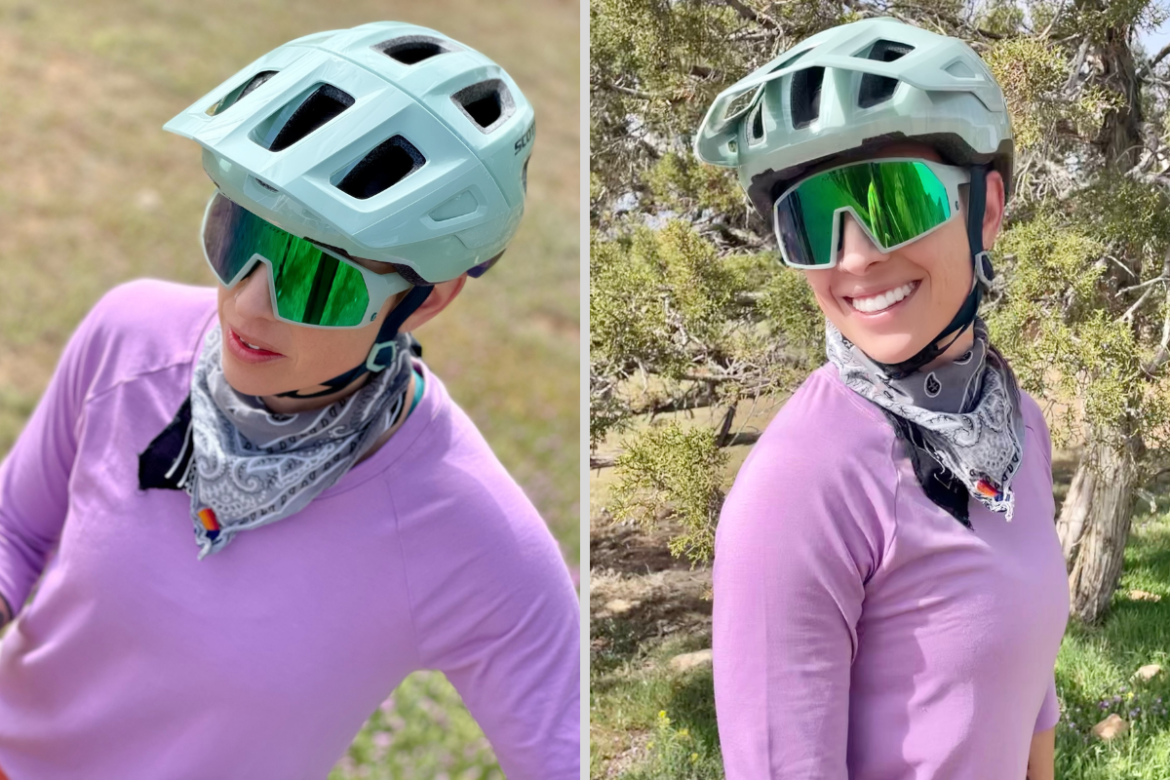
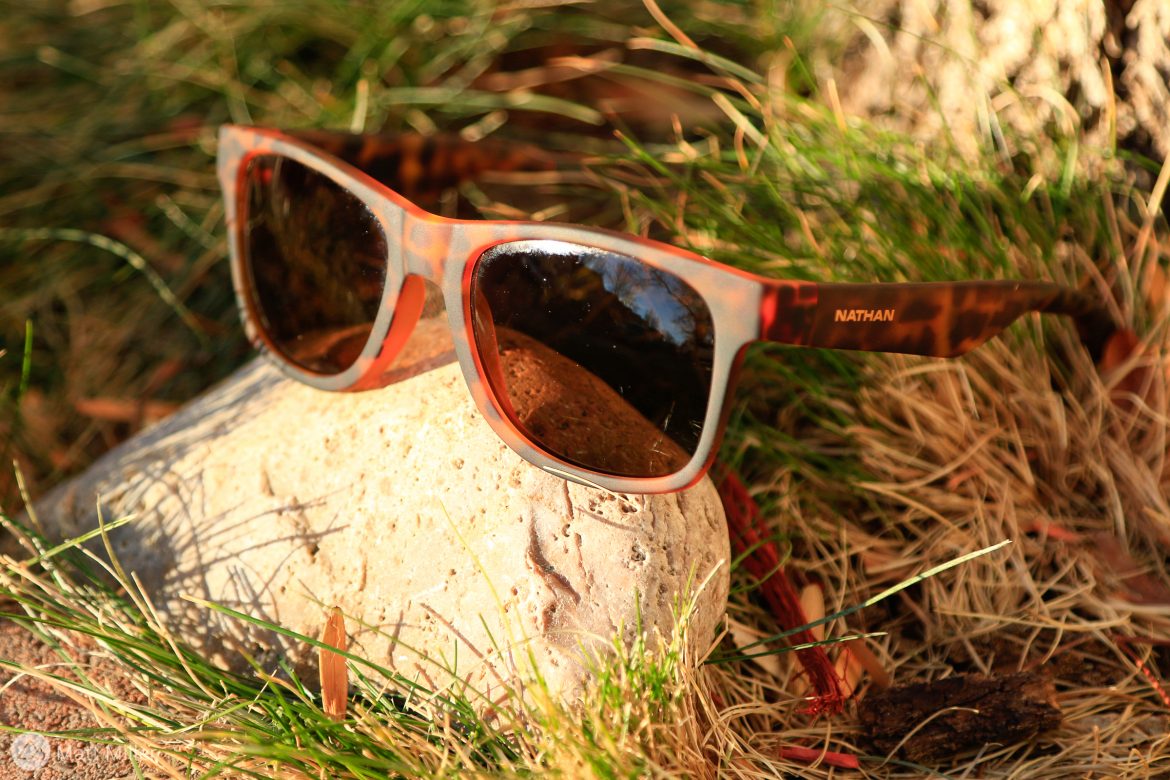


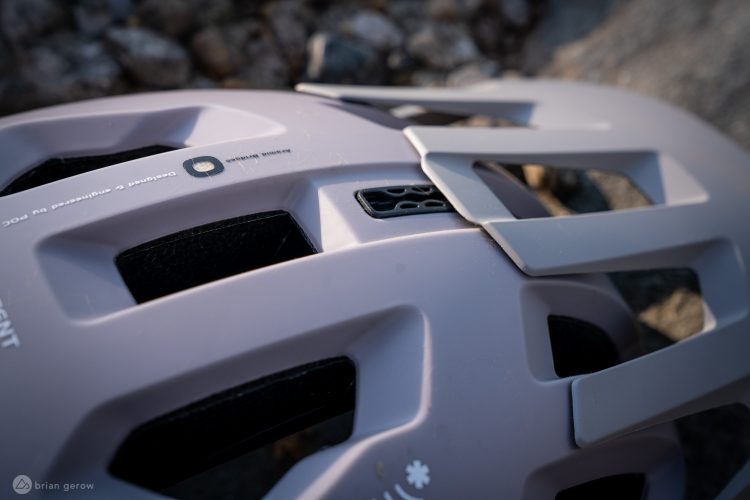

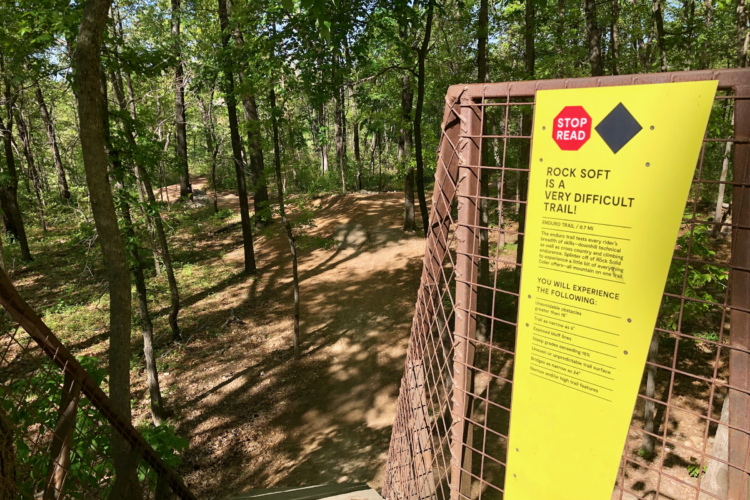
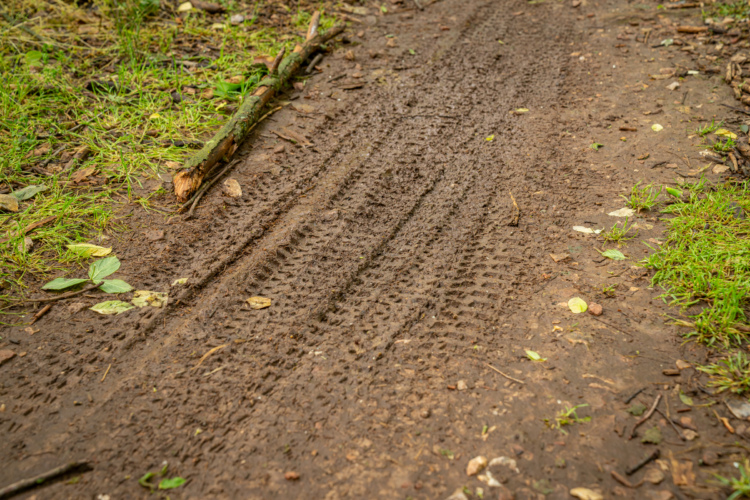
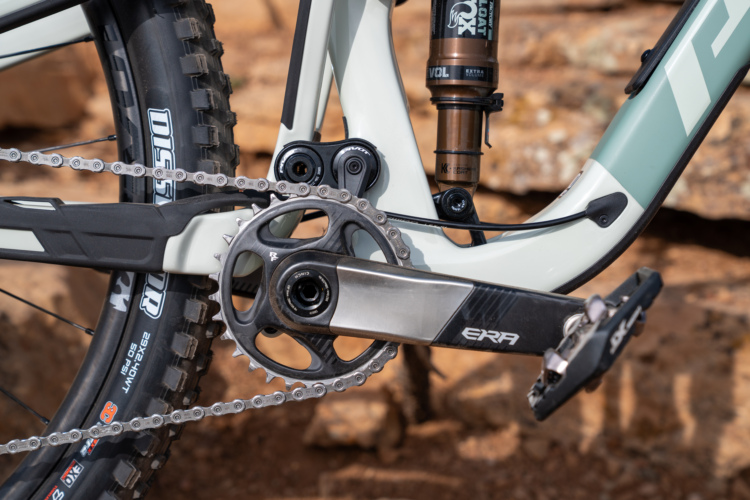
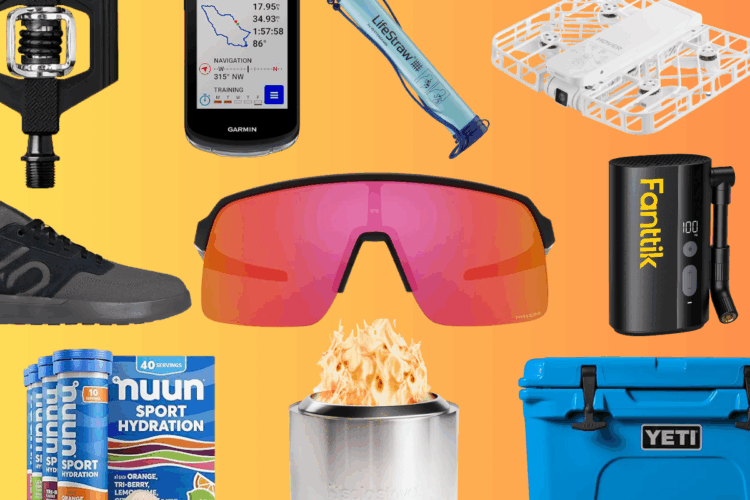

2 Comments
Oct 21, 2022
Jul 8, 2022